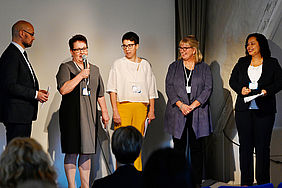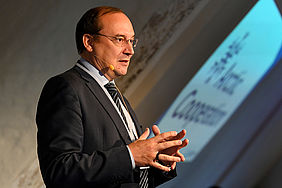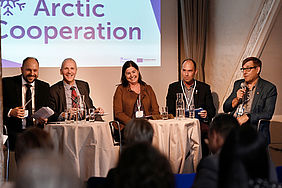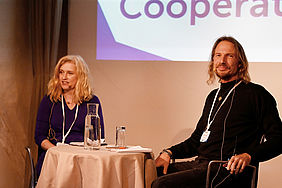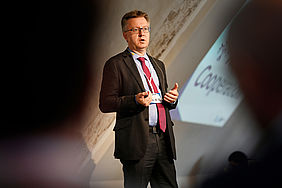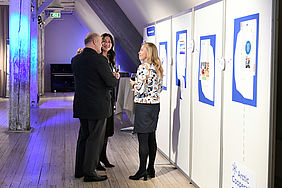The conference was jointly organized by the five programmes operating in the Arctic – Interreg Botnia-Atlantica, Interreg Nord, Kolarctic CBC, Karelia CBC and the Northern Periphery and Arctic.
As the Arctic region has received a growing attention from policy makers and investors, the Conference highlighted the need for a more coordinated regional development and presented the results of cooperation between five Arctic programmes.
The Arctic Award Ceremony
The evening of the 17th September has started with a music performance by a Greenlandic band SULUIT, whose songs are inspired by traditional Greenlandic music, myths and drum songs. Following the introduction by the Heads of Secretariats of five Arctic programmes, the festive Arctic Award 2019 ceremony began. The winners in two categories, Arctic Entrepreneurship and Sustainable use of Resources were announced and received the prize from Ambassador Jari Vilén, from the European Political Strategy Centre of the European Commission.
Later in the evening, the exhibition was open to show examples of what cooperation programmes have supported in the Arctic in the four areas of Arctic Entrepreneurial Spirit, Overcoming critical mass, Cold Climate opportunities, and Sustainable use of resources. The exhibition stayed open also during the next day and the participants were welcomed to answer the question “What can Cooperation Programmes do for the Arctic?”
The Arctic Cooperation Conference
On the next day, 18th September 2019, the Arctic Cooperation Conference has started by introduction speech from Heads of the Arctic programmes who explained the focus of each programme, their resources and what have they achieved so far in the Arctic Cooperation. After that, the first of the keynote speakers Ambassador Jari Vilén has introduced the Arctic Strategy for the EU highlighting the need for a proactive engagement from all stakeholders in the room to contribute to the shaping of the future EU strategy.
Before the coffee break, three projects APP4SEA (Northern Periphery and Arctic), Grab (Kolarctic CBC), and Cleantech (Interreg Botnia-Atlantica) have presented their innovative and successful projects in the areas of oil spill recovery, energy efficiency in buildings and entreprise support in the field of cleantech.
To bring the regional perspective into the Arctic Cooperation discussion, representatives from the regions: Mr Kaj Suomela (Regional Council of Ostrobothnia, Finland), Mr Rickard Carstedt (Regional Council of Västerbotten, Sweden), Mr Stuart Black (The High Council, Scotland), Ms Irene Dahl (Troms County Council, Norway), Mr Ilya Ostapchuk (Murmansk Regional Government, Russia), were invited on stage to share their view and vision on Arctic cooperation. There was broad consensus among all panellists on the advantages that cooperation brings to regional development and on the need to continue in the future.
An after lunch chat between Mr Bernhard Schasberger (INTERACT Point Vienna, Austria) and Dr Irene McMaster (European Policies Research Centre at University of Strathclyde, Scotland) reflected about the Arctic Cooperation and compared it with similar cooperation strategies in Europe.
Afterwards, representatives of two projects, AIDA (Interreg Nord) and Kalitka (Karelia CBC) have presented the results, challenges, and ambitions of their projects in the field of cultural heritage.
Before closing the Conference, the second keynote speaker, Mr Moray Gilland, Head of Unit for Policy Development and Economic Analysis at the DG Regio, European Commission, gave a presentation about the future of Interreg and advised programmes how to best prepare for the upcoming programming period.
The Arctic Cooperation Conference has been entirely live streamed through the Northern Periphery and Arctic programme´s Facebook page and is still available online divided into three sessions.
We would like to thank all the guests for coming and sharing their insight on what can cooperation programmes do for the Arctic!

